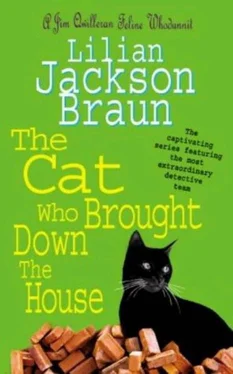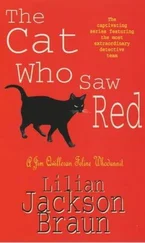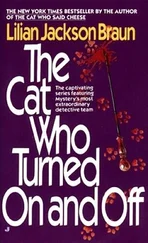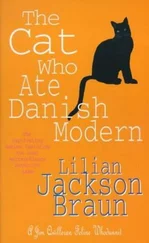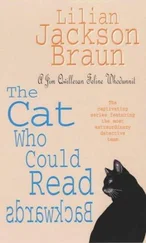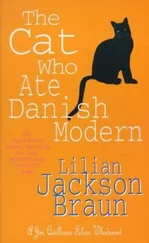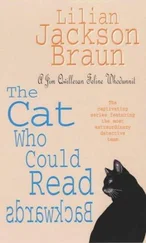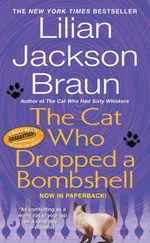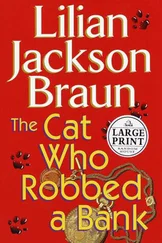Lilian Braun - The Cat Who Brought Down the House
Здесь есть возможность читать онлайн «Lilian Braun - The Cat Who Brought Down the House» весь текст электронной книги совершенно бесплатно (целиком полную версию без сокращений). В некоторых случаях можно слушать аудио, скачать через торрент в формате fb2 и присутствует краткое содержание. Год выпуска: 2003, ISBN: 2003, Издательство: Jove, Жанр: Старинная литература, на английском языке. Описание произведения, (предисловие) а так же отзывы посетителей доступны на портале библиотеки ЛибКат.
- Название:The Cat Who Brought Down the House
- Автор:
- Издательство:Jove
- Жанр:
- Год:2003
- ISBN:9780515136555
- Рейтинг книги:4 / 5. Голосов: 1
-
Избранное:Добавить в избранное
- Отзывы:
-
Ваша оценка:
- 80
- 1
- 2
- 3
- 4
- 5
The Cat Who Brought Down the House: краткое содержание, описание и аннотация
Предлагаем к чтению аннотацию, описание, краткое содержание или предисловие (зависит от того, что написал сам автор книги «The Cat Who Brought Down the House»). Если вы не нашли необходимую информацию о книге — напишите в комментариях, мы постараемся отыскать её.
The Cat Who Brought Down the House — читать онлайн бесплатно полную книгу (весь текст) целиком
Ниже представлен текст книги, разбитый по страницам. Система сохранения места последней прочитанной страницы, позволяет с удобством читать онлайн бесплатно книгу «The Cat Who Brought Down the House», без необходимости каждый раз заново искать на чём Вы остановились. Поставьте закладку, и сможете в любой момент перейти на страницу, на которой закончили чтение.
Интервал:
Закладка:
Next he phoned the official county historian to inquire about the Thackeray family. Homer Tibbitt was ninety-eight, and he lived with his wife, Rhoda, at Ittibittiwassee Estates, a retirement residence out in the country. They were virtually newlyweds. Neither had been married before, and theirs was considered the romance of the century.
Rhoda answered the phone in her sweet trembling voice and turned it over to Homer, whose vocal delivery was reedy and high-pitched, but vigorous. “The only thing I know about the Thackeray family is that Milo was a bootlegger in the Thirties, Thornton Haggis would have all that information. He read a paper at a meeting of the historical society—all about our fair county during Prohibition.”
So Qwilleran phoned the Thornton Haggis residence. Thorn, as he liked to be called, was a fourth-generation stonecutter, now retired from the family’s monument works. He had a degree in art history from a university Down Below and now gave liberally of his time to the local art community. His wife told Qwilleran to call the Art Center; Thorn was helping to hang a new exhibition.
Sure enough, the volunteer was up on a ladder when Qwilleran phoned. “I can tell you a thing or two about Moose County’s boozy history. Where are you, Qwill? At the barn? The job here will be finished in a half hour, and I'll drive up there. Brew some of that lethal coffee you like!”
It was generally assumed that Thornton would take over the unpaid job of county historian when, if ever, Homer retired. The records of the monument works went back to 1850, when tombstones were chiseled with name, the vital statistics, cause of death, and names of survivors and family pets. Also, examples of wit and humor were chipped into the stone at modest price-per-letter.
Qwilleran’s visitor had a rampant shock of snow-white hair visible a block away. The Siamese always became unusually frisky when he appeared. “Is that a compliment?” he asked. “Or do they suspect me of something?”
Qwilleran suggested, “They associate your last name with something good to eat. Cats have a clever way of putting two and two together.”
“I drove around by the library and picked up the paper I wrote for the local history collection. It’s the one I read at the meeting of the Old Timers Club. It made some of them cry.”
“Good! Let’s go out to the gazebo with some refreshments, and you can read it to me. I'll take a box of tissues.”
It was a pleasantly warm day—and an hour when the wild creatures were not too noisy. What looked like red wine on the refreshment tray was actually Squunk water from a local mineral spring, with a slug of cranberry juice. Thom smacked his lips. “You could bottle this stuff and sell it!”
Qwilleran turned on his tape recorder, and the following was later transcribed for Short & Tall Tales, a collection of local legends.
MILO THE POTATO FARMER
Milo Thackeray and my grandfather were good friends. They played checkers and went hunting together—varmints and deer. Hunting was not a sport in those days. For many struggling families it was a way to put food on the table. Hard times had come to Moose County in the early twentieth century. Yet this had been the richest county in the state when natural resources were being exploited.
Then the ten mines closed, leaving entire villages without hope of work; the forests were lumbered out; there was no market for quarry stone; the ship-building industry went elsewhere when steamboats replaced tall-masted schooners. Thousands of persons fled Down Below, hoping to find work in factories, and those who remained had little money to spend on potatoes and tombstones. Milo was a potato farmer, and Gramps was a stonecutter.
It had been a year of tragedy for the potato farmer. His eldest son was one of the first casualties of World War One; two younger children died in the influenza epidemic; and now his wife died while giving birth to twins, Thelma and Thurston. They were his salvation! Gramps was there when Milo swore an oath to give them a better life than he had known. A sister-in-law came in to care for them, and eventually Milo married her. Eventually, too, his life took a strange turn.
In 1919 the Volstead Act went into effect, and thirsty citizens provided a large market for illegal beverages. Somehow, Milo learned he could make hard liquor from potatoes. Gramps helped him build a distillery, and it worked! Customers came to the farm in Model T cars and horse-drawn wagons. Unfortunately for the jubilant farmer, revenue agents also came. They smashed the still and poured the liquor on the ground. (Even to this day the belief persists that the act accounts for the superior flavor of Moose County potatoes.)
Milo was undaunted! His twins were growing fast, and he had sworn an oath.
Across the lake, a hundred miles away, was Canada, famous for good whiskey. On the shore of Moose County there were scores of commercial fishermen who were getting only a penny a pound for their catch. Milo organized a fleet of rumrunners to bring the whiskey over under cover of darkness. Soon a steady stream of Model T trucks was coming north to haul it away, camouflaged in many ingenious ways.
The poor potato farmer became the rich bootlegger.
Transactions were made in cash, and Gramps held the lantern while Milo buried the money in the backyard.
Every weekend Milo took his family and their young friends to Lockmaster for a picnic and moving picture show. The back of the truck was filled with kids sitting on disguised cases of contraband. Milo never attended the show, and the seats were never there for the return trip.
There was no such entertainment in Moose County. The twins begged their father to open a picture show in Pickax.
Prohibition ended in 1933, but the potato farmer was in a position to indulge his twins. He bought the old opera house, long boarded up, and made it the Pickax Movie Palace. He financed their chosen careers. •
Besides their sex, the twins were very different. Thurston was slight of build and more sensitive; he loved dogs and horses and wanted to be a veterinarian. Milo sent him to Cornell, where he earned his D.V.M. degree.
Thelma was taller, huskier, and bolder; she wanted to be ‘in pictures’. Milo sent her to Hollywood with her stepmother as chaperone. He never saw either of the women again.
Thelma obtained bit parts in two B films and decided she would prefer the food business, playing the leading role as hostess in her own restaurant. Milo first financed a snack shop (the Thackeray Snackery) and then a fine restaurant called simply Thelma’s. She did very well. When Milo died he left his fortune to Thurston, to establish the Thackeray Animal Clinic in Lockmaster, and to Thelma, to realize her dream of a private dinner club for connoisseurs of old movies.
Milo was buried in the Hilltop Cemetery, with Gramps as the sole mourner. And Gramps chiseled the headstone the way his friend wanted it: MILO THE POTATO FARMER.
“Good story!” Qwilleran said as he turned off the tape recorder. “Is Thelma’s twin still living?”
“No, Dr Thurston was killed in an accident a year or so ago. There was a rumor that it was murder, but no charges were brought. The gossips said that a group of horse breeders had been trying to buy the Thackeray Clinic but Thurston wouldn’t sell. Right after his death they bought it from the estate and changed the name. I don’t read the Lockmaster Ledger, so I don’t know any details. But the idea of murder didn’t make sense to me.”
“Well, anyway, the twin sister is returning to her hometown for some "fun," according to an item in the Something.”
“My wife told me about it. Am I supposed to get excited about it? Sounds to me as if she’s been out in the sun too long!”
Читать дальшеИнтервал:
Закладка:
Похожие книги на «The Cat Who Brought Down the House»
Представляем Вашему вниманию похожие книги на «The Cat Who Brought Down the House» списком для выбора. Мы отобрали схожую по названию и смыслу литературу в надежде предоставить читателям больше вариантов отыскать новые, интересные, ещё непрочитанные произведения.
Обсуждение, отзывы о книге «The Cat Who Brought Down the House» и просто собственные мнения читателей. Оставьте ваши комментарии, напишите, что Вы думаете о произведении, его смысле или главных героях. Укажите что конкретно понравилось, а что нет, и почему Вы так считаете.
